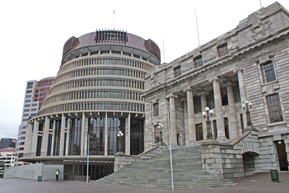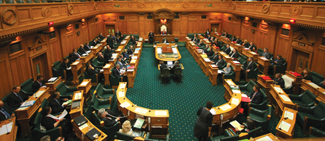|
||||||||||||||||
|
||||||||||||||||
%
responses 2009 ('05) |
||||||||||||||||
y4 |
y8 |
|||||||||||||||
| 1.
Why does New Zealand need a Parliament? |
||||||||||||||||
| debate issues that affect New Zealand and New Zealanders | 25 (23) | 47 (40) | ||||||||||||||
| make laws/rules for New Zealand people to follow | 14 (20) | 40 (39) | ||||||||||||||
| plan, oversee and fund important public services (e.g. education, health, police) | 5 (13) | 10 (21) | ||||||||||||||
| decide how New Zealand should act towards other countries (e.g. treaties, aid, sanctions, war) | 1 (2) | 3 (8) | ||||||||||||||
| 2. One of the important jobs of Parliament is to make decisions about laws. How are decisions made in Parliament? | ||||||||||||||||
| Description of process: | ||||||||||||||||
| (Law proposed by the government or a Member of Parliament, goes to committee stage, considered again in Parliament with amendments, may go back to committee for more consideration, final decision voted on in Parliament. At each of these stages a lot of negotiation may occur between MPs.) | ||||||||||||||||
| clear full description | 0 (0) | 1 (0) | ||||||||||||||
| moderately good description | 2 (3) | 9 (10) | ||||||||||||||
| very limited description | 25 (33) | 51 (57) | ||||||||||||||
| no useful response | 73 (65) | 39 (33) | ||||||||||||||
| 3. How does a person get to be a Member of Parliament? | ||||||||||||||||
| Mentioned: | selection by party/nomination | 3 (4) | 12 (13) | |||||||||||||
| campaigning for votes | 1 (1) | 4 (3) | ||||||||||||||
| voting (by registered voters) | 7 (15) | 18 (28) | ||||||||||||||
| the difference between winning an electorate seat or a party list seat | 0 (0) | 1 (2) | ||||||||||||||
Total
score: |
5–9
|
1 (3) | 3 (8) | |||||||||||||
| 4
|
2 (3) | 9 (9) | ||||||||||||||
| 3
|
7 (5) | 20 (23) | ||||||||||||||
| 2
|
14 (23) | 33 (32) | ||||||||||||||
| 1
|
25 (29) | 23
(18) |
||||||||||||||
| 0 | 51 (37) | 12 (10) | ||||||||||||||
| Subgroup Analysis [Click on charts to enlarge] : |
| Commentary: |
| Approximately
half of year 8 students understood the reason for having a parliament
in relation to the laws and people of New Zealand, but few could identify determining New Zealand’s relationship with other countries or providing public services as a role of parliament. Students at both year levels had, at most, a limited understanding of how laws were made or how a person becomes a Member of Parliament. There were minimal differences between boys and girls at either year level, and between Mäori, Pasifika and Pakeha students at year 8. The patterns of responses were similar for 2009 and 2005. |



